人教版九年级全册Unit10 You're supposed to shake hands SectionB 2a-2e课件(共18张PPT)
文档属性
| 名称 | 人教版九年级全册Unit10 You're supposed to shake hands SectionB 2a-2e课件(共18张PPT) |
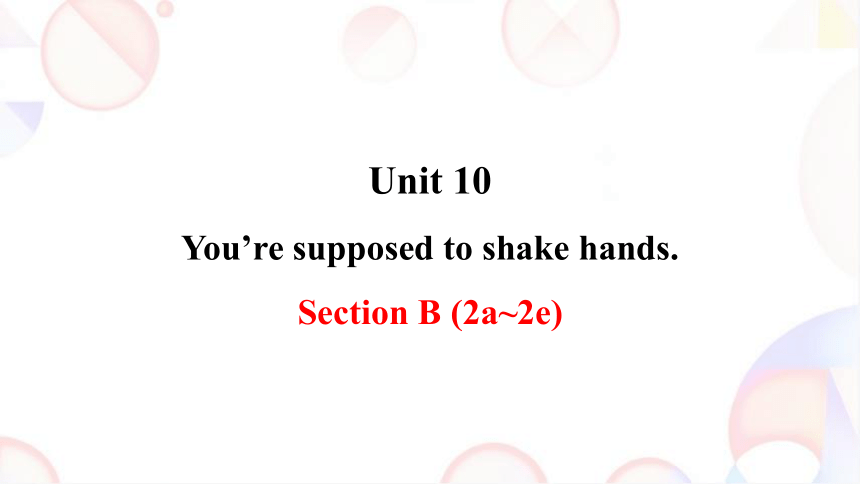
|
|
| 格式 | pptx | ||
| 文件大小 | 2.1MB | ||
| 资源类型 | 教案 | ||
| 版本资源 | 人教新目标(Go for it)版 | ||
| 科目 | 英语 | ||
| 更新时间 | 2024-09-21 09:21:06 | ||
图片预览

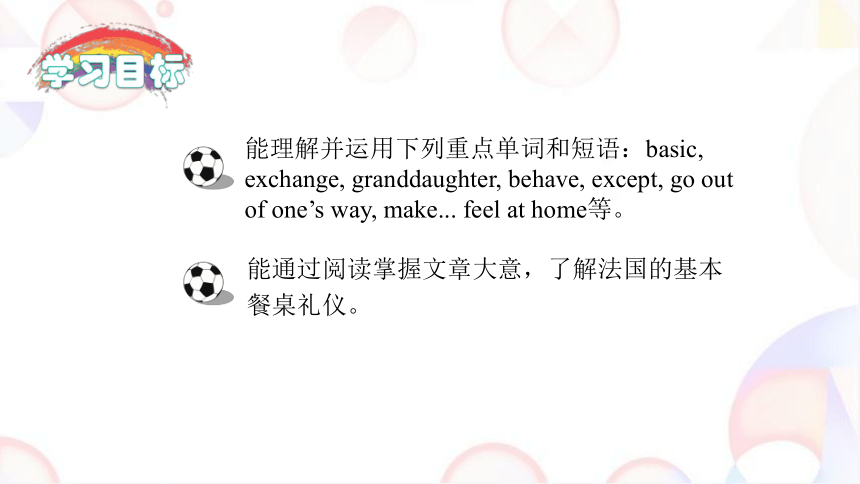

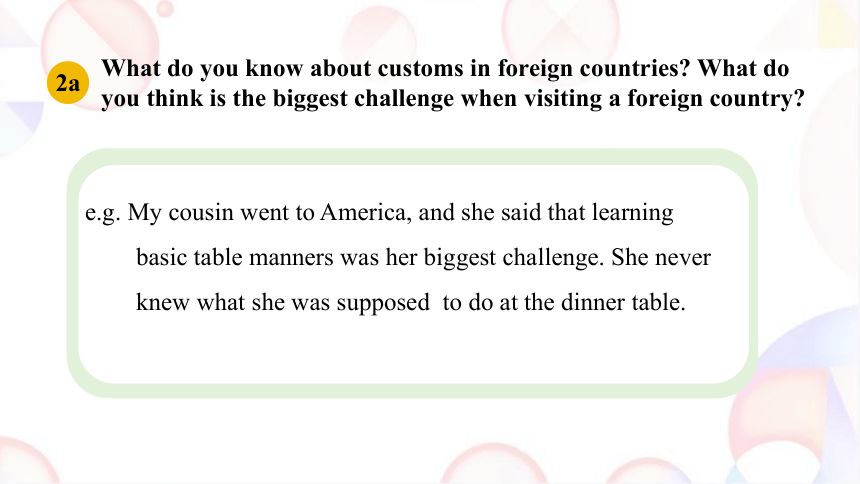
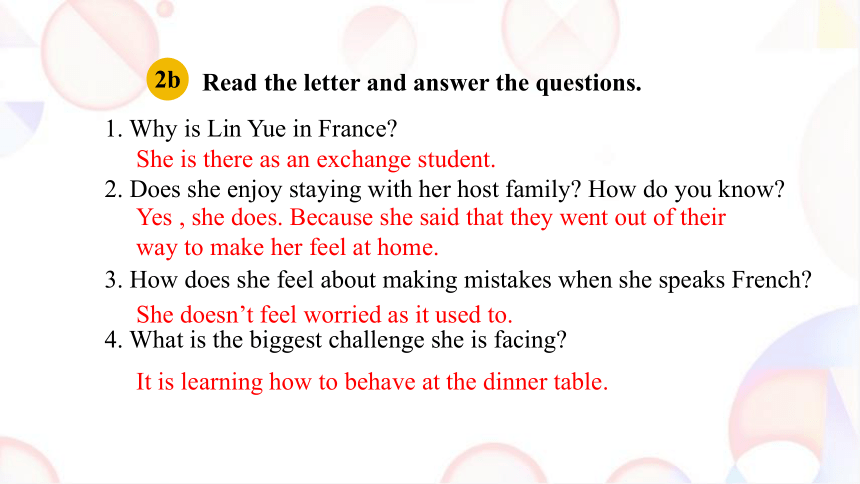
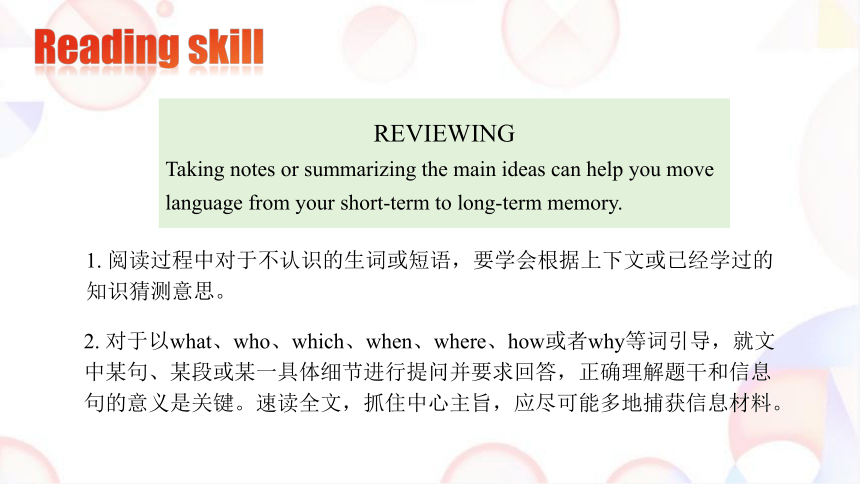
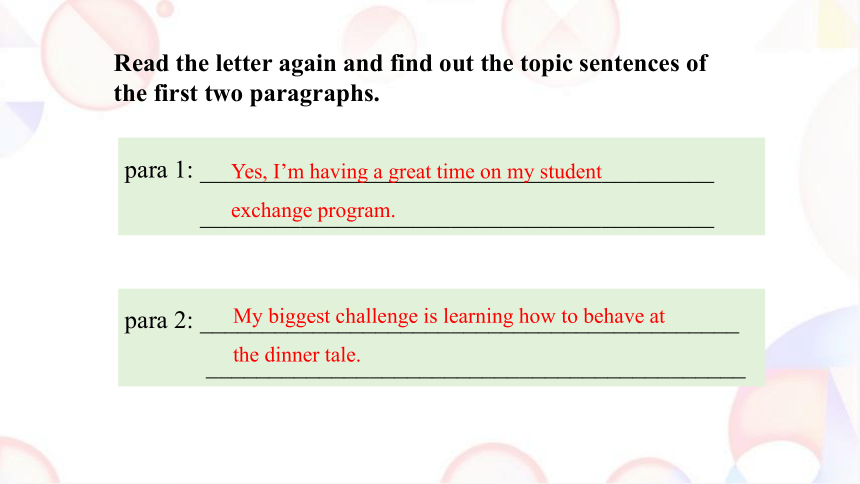
文档简介
(共18张PPT)
Unit 10
You’re supposed to shake hands.
Section B (2a~2e)
学习目标
能理解并运用下列重点单词和短语:basic, exchange, granddaughter, behave, except, go out of one’s way, make... feel at home等。
能通过阅读掌握文章大意,了解法国的基本餐桌礼仪。
What do you know about customs in foreign countries
India
Korea
France
the US
新课讲授
e.g. My cousin went to America, and she said that learning basic table manners was her biggest challenge. She never knew what she was supposed to do at the dinner table.
What do you know about customs in foreign countries What do you think is the biggest challenge when visiting a foreign country
2a
Read the letter and answer the questions.
2b
1. Why is Lin Yue in France
2. Does she enjoy staying with her host family How do you know
3. How does she feel about making mistakes when she speaks French
4. What is the biggest challenge she is facing
She is there as an exchange student.
Yes , she does. Because she said that they went out of their way to make her feel at home.
She doesn’t feel worried as it used to.
It is learning how to behave at the dinner table.
REVIEWING
Taking notes or summarizing the main ideas can help you move language from your short-term to long-term memory.
1. 阅读过程中对于不认识的生词或短语,要学会根据上下文或已经学过的知识猜测意思。
2. 对于以what、who、which、when、where、how或者why等词引导,就文中某句、某段或某一具体细节进行提问并要求回答,正确理解题干和信息句的意义是关键。速读全文,抓住中心主旨,应尽可能多地捕获信息材料。
Reading skill
Read the letter again and find out the topic sentences of the first two paragraphs.
para 1: _________________________________________
_________________________________________
para 2: ___________________________________________
___________________________________________
Yes, I’m having a great time on my student exchange program.
My biggest challenge is learning how to behave at the dinner tale.
Read the first paragraph and complete the chart.
How does Lin Yue feel in each period
Before she arrived: _______________________________
After she arrived: _________________________________
________________________________________________
________________________________________________
Now: ____________________________________
She was a bit nervous.
The host family is really nice. The grandmother learned how to make Chinese food. Her granddaughter always help her practice French.
She is very comfortable speaking French.
1. Making mistakes in French used to make Lin Yue nervous.
2. It was quite hard for her to feel good about speaking French.
3. The host family tried very hard to help Lin Yue.
4. Lin Yue has slowly learned how to be like her French friends.
went out of their way
be comfortable (doing)
gradually gotten used to being
(something) worry (someone)
1
2
3
4
2c
Read the sentences and replace the underlined words with the phrases in the box.
Dos Don’ts
You’re expected to put your bread on the table.
You’re not supposed to put your bread on your plate.
You’re expected to cut up your fruit and eat it with a fork.
You’re expected to say “That was delicious” if you don’t want any more food.
You are not supposed to eat anything with your hands except bread.
You’re not supposed to say you are full.
You are not supposed to put your elbows on the table.
Review the passage and make notes about French customs in the chart.
2d
e.g. In France, people put their bread on the table.
But in China, we always put our food on a plate
or in a bowl. We never put food on the table.
2e
Compare the table manners in France and China in your group. How are they the same or different Make a list.
e. g. Can I exchange an apple for
four oranges
我可以用一个苹果换四个橘子吗
exchange ... for ... 用…交换…
e. g.Will you exchange seats with me
你愿意和我换座位吗
exchange ... with sb. 与某人交换…
e. g. We need to promote an
open exchange of ideas.
我们应该促进思想的公开交流。
e. g.I gave him a book in
exchange for a stamp.
我给了他一本书, 换一枚邮票。
an exchange of 交换……
1. Yes, I’m having a great time on my student exchange program in France.
in exchange (for) 交换(......)
Language points
2. They go out of their way to make me feel at home.
(2) make . . . feel at home 使 (某人) 感到宾至如归
e.g. Lucy’s mother tried to make us feel at home.
Lucy的妈妈尽力让我们感觉像在家里一样。
(1) go out of one’ s way 特地; 格外努力
e.g. He went out of his way to start the car, but he failed.
他想尽一切办法来发动这辆车, 但他失败了。
3. So she actually learned how to make Chinese food!
这句话中出现了“疑问词+ 动词不定式”结构。
“疑问词 + 动词不定式”结构常位于以下动词后作宾语:
tell, remember, know, learn, teach, forget, wonder等。
e. g. Could you please tell me how to get to the station
你能告诉我怎样到达车站吗
4. You wouldn’t believe how quickly my French has improved
because of that.
because 连词, 引导原因状语从句。
e.g. Because the traffic was so heavy, she failed to arrive at the
station on time. 因为交通太拥挤, 她没能准时到达车站。
because of 介词短语,后常接名词、代词或动名词。
e.g. Because of your help, I caught up with the other students.
因为你的帮助, 我赶上了其他同学。
5.Another example is that you’re not supposed to eat anything
with your hands except bread, not even fruit.
(2) except for“除……以外”,其后被排除的内容与主语不是同一类。
e.g.Your composition is quite good except for a few spelling mistakes.
除了几处拼写错误外, 你的作文相当好。
(1) except “除……之外”, 其后的宾语被排除在外。
e. g. He gets up early every day except Sunday.
他除了星期天之外每天都早起。
(3) besides “除……之外 (还 )”。其后的宾语被包含在内。
e.g.What other languages do you know besides English
除了英语之外, 你还懂其他什么语言
6. You have to cut it up and eat it with a fork.
cut up为动副结构的短语,后接名词时,名词放在中间或后面均可;后接代词时,代词只能放在中间。
e.g.Would you mind cutting up the apple
你介意把苹果切成小块吗
Don’t cut it up.
不要把它切碎。
cut up的意思是“切碎”
1. We had to put off the sports meeting _______ the heavy snow.
A. when B. because
C. because of D. after
2. The meat was hard to chew and I had to _______.
A. cut it down B. cut it up
C. cut off it D. cut up it
3. All of us helped to clean up the old people’s home _______Eric.
He had a bad cold.
A. besides B. agains
C. except D. with
当堂检测
Unit 10
You’re supposed to shake hands.
Section B (2a~2e)
学习目标
能理解并运用下列重点单词和短语:basic, exchange, granddaughter, behave, except, go out of one’s way, make... feel at home等。
能通过阅读掌握文章大意,了解法国的基本餐桌礼仪。
What do you know about customs in foreign countries
India
Korea
France
the US
新课讲授
e.g. My cousin went to America, and she said that learning basic table manners was her biggest challenge. She never knew what she was supposed to do at the dinner table.
What do you know about customs in foreign countries What do you think is the biggest challenge when visiting a foreign country
2a
Read the letter and answer the questions.
2b
1. Why is Lin Yue in France
2. Does she enjoy staying with her host family How do you know
3. How does she feel about making mistakes when she speaks French
4. What is the biggest challenge she is facing
She is there as an exchange student.
Yes , she does. Because she said that they went out of their way to make her feel at home.
She doesn’t feel worried as it used to.
It is learning how to behave at the dinner table.
REVIEWING
Taking notes or summarizing the main ideas can help you move language from your short-term to long-term memory.
1. 阅读过程中对于不认识的生词或短语,要学会根据上下文或已经学过的知识猜测意思。
2. 对于以what、who、which、when、where、how或者why等词引导,就文中某句、某段或某一具体细节进行提问并要求回答,正确理解题干和信息句的意义是关键。速读全文,抓住中心主旨,应尽可能多地捕获信息材料。
Reading skill
Read the letter again and find out the topic sentences of the first two paragraphs.
para 1: _________________________________________
_________________________________________
para 2: ___________________________________________
___________________________________________
Yes, I’m having a great time on my student exchange program.
My biggest challenge is learning how to behave at the dinner tale.
Read the first paragraph and complete the chart.
How does Lin Yue feel in each period
Before she arrived: _______________________________
After she arrived: _________________________________
________________________________________________
________________________________________________
Now: ____________________________________
She was a bit nervous.
The host family is really nice. The grandmother learned how to make Chinese food. Her granddaughter always help her practice French.
She is very comfortable speaking French.
1. Making mistakes in French used to make Lin Yue nervous.
2. It was quite hard for her to feel good about speaking French.
3. The host family tried very hard to help Lin Yue.
4. Lin Yue has slowly learned how to be like her French friends.
went out of their way
be comfortable (doing)
gradually gotten used to being
(something) worry (someone)
1
2
3
4
2c
Read the sentences and replace the underlined words with the phrases in the box.
Dos Don’ts
You’re expected to put your bread on the table.
You’re not supposed to put your bread on your plate.
You’re expected to cut up your fruit and eat it with a fork.
You’re expected to say “That was delicious” if you don’t want any more food.
You are not supposed to eat anything with your hands except bread.
You’re not supposed to say you are full.
You are not supposed to put your elbows on the table.
Review the passage and make notes about French customs in the chart.
2d
e.g. In France, people put their bread on the table.
But in China, we always put our food on a plate
or in a bowl. We never put food on the table.
2e
Compare the table manners in France and China in your group. How are they the same or different Make a list.
e. g. Can I exchange an apple for
four oranges
我可以用一个苹果换四个橘子吗
exchange ... for ... 用…交换…
e. g.Will you exchange seats with me
你愿意和我换座位吗
exchange ... with sb. 与某人交换…
e. g. We need to promote an
open exchange of ideas.
我们应该促进思想的公开交流。
e. g.I gave him a book in
exchange for a stamp.
我给了他一本书, 换一枚邮票。
an exchange of 交换……
1. Yes, I’m having a great time on my student exchange program in France.
in exchange (for) 交换(......)
Language points
2. They go out of their way to make me feel at home.
(2) make . . . feel at home 使 (某人) 感到宾至如归
e.g. Lucy’s mother tried to make us feel at home.
Lucy的妈妈尽力让我们感觉像在家里一样。
(1) go out of one’ s way 特地; 格外努力
e.g. He went out of his way to start the car, but he failed.
他想尽一切办法来发动这辆车, 但他失败了。
3. So she actually learned how to make Chinese food!
这句话中出现了“疑问词+ 动词不定式”结构。
“疑问词 + 动词不定式”结构常位于以下动词后作宾语:
tell, remember, know, learn, teach, forget, wonder等。
e. g. Could you please tell me how to get to the station
你能告诉我怎样到达车站吗
4. You wouldn’t believe how quickly my French has improved
because of that.
because 连词, 引导原因状语从句。
e.g. Because the traffic was so heavy, she failed to arrive at the
station on time. 因为交通太拥挤, 她没能准时到达车站。
because of 介词短语,后常接名词、代词或动名词。
e.g. Because of your help, I caught up with the other students.
因为你的帮助, 我赶上了其他同学。
5.Another example is that you’re not supposed to eat anything
with your hands except bread, not even fruit.
(2) except for“除……以外”,其后被排除的内容与主语不是同一类。
e.g.Your composition is quite good except for a few spelling mistakes.
除了几处拼写错误外, 你的作文相当好。
(1) except “除……之外”, 其后的宾语被排除在外。
e. g. He gets up early every day except Sunday.
他除了星期天之外每天都早起。
(3) besides “除……之外 (还 )”。其后的宾语被包含在内。
e.g.What other languages do you know besides English
除了英语之外, 你还懂其他什么语言
6. You have to cut it up and eat it with a fork.
cut up为动副结构的短语,后接名词时,名词放在中间或后面均可;后接代词时,代词只能放在中间。
e.g.Would you mind cutting up the apple
你介意把苹果切成小块吗
Don’t cut it up.
不要把它切碎。
cut up的意思是“切碎”
1. We had to put off the sports meeting _______ the heavy snow.
A. when B. because
C. because of D. after
2. The meat was hard to chew and I had to _______.
A. cut it down B. cut it up
C. cut off it D. cut up it
3. All of us helped to clean up the old people’s home _______Eric.
He had a bad cold.
A. besides B. agains
C. except D. with
当堂检测
同课章节目录
- Unit 1 How can we become good learners.
- Section A
- Section B
- Unit 2 I think that mooncakes are delicious!
- Section A
- Section B
- Unit 3 Could you please tell me where the restroom
- Section A
- Section B
- Unit 4 I used to be afraid of the dark.
- Section A
- Section B
- Unit 5 What are the shirts made of?
- Section A
- Section B
- Review of Units 1-5
- Unit 6 When was it invented?
- Section A
- Section B
- Unit 7 Teenagers should be allowed to choose their
- Section A
- Section B
- Unit 8 It must belong to Carla.
- Section A
- Section B
- Unit 9 I like music that I can dance to.
- Section A
- Section B
- Unit 10 You're supposed to shake hands.
- Section A
- Section B
- Review of Units 6-10
- Unit 11 Sad movies make me cry.
- Section A
- Section B
- Unit 12 Life is full of the unexpected
- Section A
- Section B
- Unit 13 We're trying to save the earth!
- Section A
- Section B
- Unit 14 I remember meeting all of you in Grade 7.
- Section A
- Section B
- Review of Units 11-14
